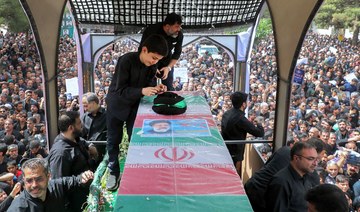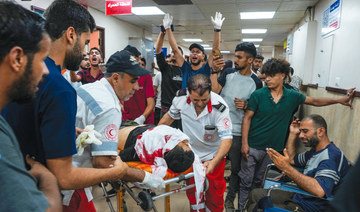LONDON: A British Cabinet minister has rebuked Turkish company Selegna Tekstil after a huge shipment of personal protective equipment (PPE) failed to meet National Health Service (NHS) standards.
Some 400,000 medical gowns arrived weeks ago to aid Britain’s fight against COVID-19, but it has been revealed that none of them can be used by NHS workers.
“I think it’s right that if we’ve got particular standards for what we want our frontline staff to be able to have access to, we make sure we stick to that,” said Northern Ireland Secretary Brandon Lewis.
“If something isn’t right, if we’re not even sure about it, then I think it’s better to be safe and not use that product, and stick with products we’re confident are the right products and the right standards.”
The dud shipment comes amid a crisis of health care workers not being provided adequate PPE in British hospitals.
It was confirmed earlier this week that the UK has the highest COVID-19 death toll in Europe.
To counter growing fears that Downing Street has not got a grip of the fight against the virus, and that doctors and nurses have been sent to work in dangerous conditions, the government has radically energized its PPE procurement procedures, including ordering equipment from overseas like the recent batch from Turkey.
The shipment from Turkey was heralded as “very significant” by British ministers in April, but the supply was branded an embarrassment after it was delayed several times.
The April 18 announcement of the Turkish shipment by Communities Secretary Robert Jenrick came amid warnings from unions and professional bodies that NHS staff could refuse to work without adequate PPE.
Jenrick said health care workers should be “assured that we’re doing everything we can to correct this issue,” and they would have the equipment they “need and deserve.”
This week, the British Medical Association announced that a survey has shown that almost half of England’s doctors have acquired their own PPE or relied on a donation after going through normal NHS providers.
The government had sent aircraft from the Royal Air Force (RAF) to collect the Turkish shipment.
Selegna Tekstil spokesman Mehmet Duzen told the BBC that “the fabric we supplied was certified, all the goods were certified,” and the company was ready to respond if there was an issue.
Ghassan Ibrahim, a journalist and expert on Turkish affairs, told Arab News: “Turkey is losing its credibility in international markets every day. Its leadership is helping some corrupt businessmen who support President Recep Tayyip Erdogan.”
Ibrahim added: “This poor batch of PPE sent to the UK is due to the low standards in industry in Turkey that come from corruption and a lack of transparency. There’s no credible data that can be trusted in Turkey.”
When asked if Britain had made a mistake in sourcing health equipment from Turkey, Ibrahim said: “It’s wrong and not wrong at the same time. If you look at the situation with the NHS needing this PPE, it had to approach every source to get it, but I thought it would’ve been more efficient and careful.”
He added: “What has worried me more is that in the UK there are higher health standards, but Turkish citizens are facing coronavirus while their medical hospitals are using the same kind of poor equipment.
“There are much lower health standards in Turkey. This is why there’s a high growth in the infection rate, with Turkey moving more or less to the same scenario as Italy at its peak.
“Some people have suggested that unless Turkey improves its health standards, it may end up in a terrible situation.”
Ibrahim said political concerns meant that “Turkey hesitated with the lockdown and didn’t take the right measures to tackle the virus. The Turkish economy is in a bad state — this is one of the reasons they resisted to delay the lockdown. But in the end, they couldn’t save the economy or lives.”
He added: “If this PPE is below health standards in the UK, then Turkey is likely sending the same poor equipment to other countries.
“This attempt at soft power will backfire, reflecting badly on Turkey and hurting other countries, including allies in Africa.
“This will especially hurt poor countries with lower health standards. It matters to the whole world how poorer countries handle the virus and the equipment they receive, because they could start a new wave of the virus.”





























